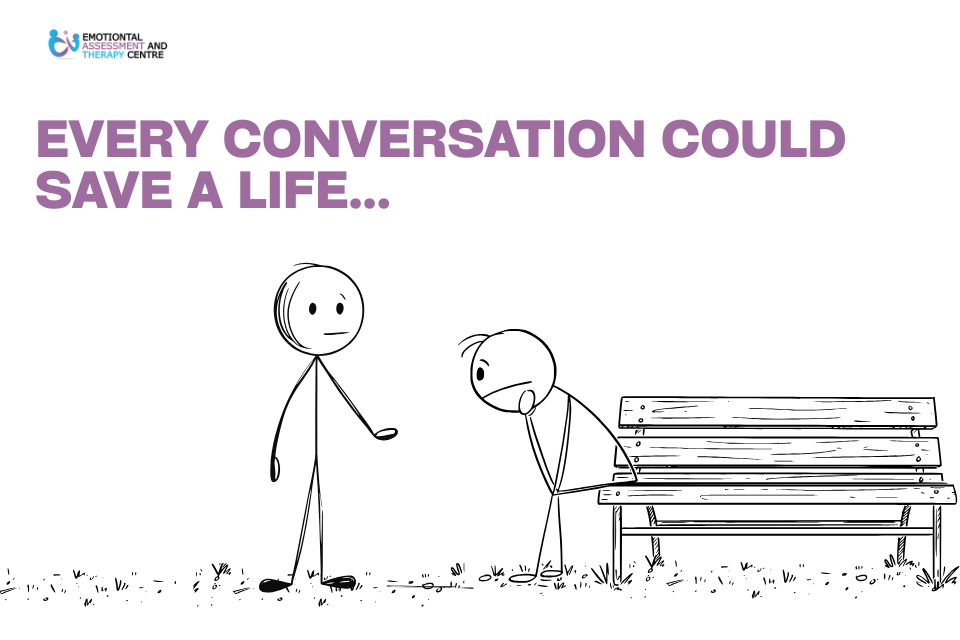Every Conversation Could Save a Life: World Suicide Prevention Day
September 10, 2025

Each year on 10 September, the world pauses to observe World Suicide Prevention Day, a time to raise awareness, reduce stigma, and promote action to save lives. Suicide is a leading cause of death globally, affecting individuals, families, and communities across every culture and background. According to the World Health Organization (WHO), more than 700,000 people die by suicide each year, and many more attempt it. Every life lost is one too many, and every attempt is a call for help that should not be ignored.
At Emotiontal Assessment and Therapy Centre, we stand with the global movement to remind ourselves and others that suicide is preventable. With compassion, awareness, and timely support, we can create a culture where every life is valued, and no one suffers in silence.
Understanding the Weight of Silence
One of the greatest risks in suicide is silence. People often feel ashamed to speak about their pain, fearing judgment or rejection. Families and friends may also avoid the topic, unsure of what to say or afraid of making things worse.
This silence, however, is heavy. It deepens isolation and convinces individuals that they are truly alone. Breaking that silence, by starting a gentle conversation or offering a listening ear, can lift part of that weight and open a pathway to safety.
Warning Signs to Watch For
While every person’s experience is unique, there are common signs that someone may be considering suicide. These include:
- Withdrawal from family, friends, or activities they once enjoyed
- Expressing feelings of hopelessness, shame, or worthlessness
- Changes in sleeping or eating habits
- Talking about death, dying, or feeling like a burden
- Sudden calmness after a period of distress, which can sometimes signal a decision has been made
Recognizing these signs early is one of the most important steps toward prevention.
The Power of Words
Words matter more than we often realize. For someone who feels unseen, a simple phrase like “I am here for you” or “You are not alone” can be a lifeline. Research shows that open, non-judgmental communication lowers distress and helps reduce the risk of suicide.
WHO emphasizes that creating safe spaces for conversation, whether at home, in schools, workplaces, or communities, is vital. These conversations should not be filled with advice or quick fixes, but with listening, empathy, and presence.
Building Protective Factors
Suicide prevention is not only about reducing risk but also about strengthening protective factors. WHO identifies several ways we can build resilience and support:
- Strong social connections: Relationships with family, friends, and community reduce isolation.
- Access to care: Early treatment for mental health conditions such as depression, anxiety, and substance use disorders can save lives.
- Reduced stigma: Communities that normalize discussions about mental health encourage people to seek help.
- Healthy coping strategies: Skills such as journaling, mindfulness, and physical activity help manage overwhelming emotions.
At Emotiontal, we believe that combining these protective factors creates a safety net where healing becomes possible.
How We Can Respond
If you suspect someone may be at risk:
- Notice changes. Trust your instincts if something feels different about someone you know.
- Ask directly. It is okay to ask, “Are you thinking about suicide?” This does not put the idea in their mind; it shows you care.
- Listen with compassion. Allow them to speak without interruption or judgment.
- Encourage professional help. Suggest speaking to a therapist, doctor, or helpline.
- Stay connected. Follow up with regular calls, messages, or visits to remind them they are not alone.
The Role of Communities and Systems
Suicide prevention is not only an individual responsibility; it requires community and systemic action. Schools can provide education on emotional literacy, workplaces can create supportive policies, and governments can ensure that mental health care is accessible and affordable.
In South Africa, organizations like the South African Depression and Anxiety Group (SADAG) play a crucial role in offering helplines and support services. By working together, communities and institutions can reduce the stigma and create safe environments where seeking help is encouraged.
World Suicide Prevention Day is not just about statistics or awareness campaigns; it is about people — our friends, colleagues, family members, and neighbours. It is about choosing to listen, to notice, and to speak hope when silence threatens to overwhelm.
Every conversation could save a life. Every act of compassion can make a difference. At Emotiontal Assessment and Therapy Centre, we commit to being part of that difference, standing alongside individuals and families on their journey toward healing.
If you or someone you know is struggling with thoughts of suicide, you do not have to face it alone.
For immediate support in South Africa, call SADAG’s Suicide Helpline: 0800 567 567 or SMS 31393
Awareness is the first breath of healing.
